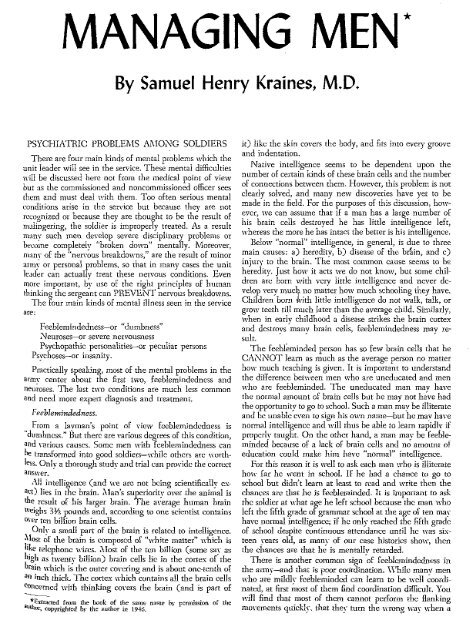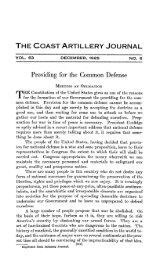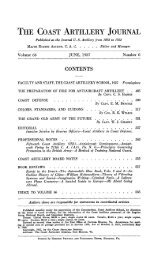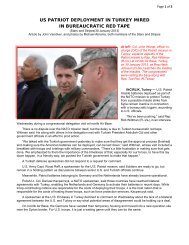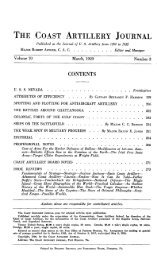Activation of new aaa units - Air Defense Artillery
Activation of new aaa units - Air Defense Artillery
Activation of new aaa units - Air Defense Artillery
You also want an ePaper? Increase the reach of your titles
YUMPU automatically turns print PDFs into web optimized ePapers that Google loves.
MANAGING MEN*<br />
By Samuel Henry Kraines, M.D.<br />
PSYCHIATRIC PROBLEMS AMONG SOLDIERS<br />
There are four main kinds <strong>of</strong> mental problems which the<br />
unit leader will see in the service. These mental difficulties<br />
will be discussed here not from the medical point <strong>of</strong> view<br />
but as the commissioned and noncommissioned <strong>of</strong>ficersees<br />
them and must deal with them. Too <strong>of</strong>ten serious mental<br />
conditions arise in the service but because they are not<br />
recognized or because they are thought to be the result <strong>of</strong><br />
malingering, the soldier is improperly treated. As a result<br />
many such men develop severe disciplinary problems or<br />
become completely "broken down" mentally. Moreover,<br />
many <strong>of</strong> the "nen-ous breakdmNns,"are the result <strong>of</strong> minor<br />
arm):or personal problems, so that in many cases the unit<br />
leader can actuallv treat these nervous conditions. Even<br />
more important, by use <strong>of</strong> the right principles <strong>of</strong> human<br />
thinking the sergeant can PREVENT nen'ous breakdowns.<br />
The four main kinds <strong>of</strong> mental illness seen in the service<br />
are;<br />
Feeblemindedness-or "dumbness"<br />
Neuroses-or severe nervousness<br />
Psychopathic personalities-or peculiar persons<br />
Psychoses-or insanity.<br />
Practically speaking, most <strong>of</strong> the mental problems in the<br />
armv center about the first two, feeblemindedness and<br />
neu~oses.The last two conditions are much less common<br />
and need more expert diagnosis and treatment.<br />
Feeblemindedness.<br />
" From a layman's point <strong>of</strong> view feeblemindedness is<br />
dumbness." But there are various degrees <strong>of</strong> this condition,<br />
and various causes. Some men with feeblemindedness can<br />
be transformed into good soldiers-while others are \\"orthless.Only<br />
a thorough study and trial can provide the correct<br />
answer.<br />
All intelligence (and we are not being scientifically exact)<br />
lies in the brain. ;,\lan's superiority over the animal is<br />
the result <strong>of</strong> his larger brain. The m'erage human brain<br />
weighs3t? pounds and, according to one scientist contains<br />
O\'erten billion brain cells.<br />
Only a small part <strong>of</strong> the brain is related to intelligence.<br />
~lost <strong>of</strong> the brain is composed <strong>of</strong> "white matter" \\"hich is<br />
hke telephone wires. i\Iost <strong>of</strong> the ten billion (some say as<br />
high as twenty billion) brain cells lie in the cortex oF" the<br />
brain which i; the outer cm:ering and is about one-tenth <strong>of</strong><br />
--<br />
an inch thick. The cortex \\"hichcontains all the brain cells<br />
concerned \vlth thinking covers the brain (and is part <strong>of</strong><br />
*Extracted from the book <strong>of</strong> the same tUffie by permission <strong>of</strong> the<br />
author, Copyrighted by the author in 1946, -<br />
it) like the skin covers the body, and fits into every groove<br />
and indentation.<br />
Native intelligence seems to be dependent upon the<br />
number <strong>of</strong> certain kinds <strong>of</strong> these brain cells and the number<br />
<strong>of</strong> connections between them. However, this problem is not<br />
clearly solved, and many <strong>new</strong> discoveries have yet to be<br />
made in the field. For the purposes <strong>of</strong> this discussion, however,<br />
we can assume that if a man has a large number <strong>of</strong><br />
his brain cells destroyed he has little intelligence left,<br />
whereas the more he has intact the better is his intelligence.<br />
Belmv "normal" intelligence, in general, is due to three<br />
main causes; a) hereditv, b) disease <strong>of</strong> the brftin, and c)<br />
injury to the brain. Th~ most common cause seems to be<br />
heredity. Just how it acts we do not know, but some children<br />
are born ~withvery little intelligence and never develop<br />
very mudil no matter how much schooling they have.<br />
Children born -.b.-ithlittle intelligence do not walk, talk, or<br />
grow teeth till much later than the average child. Similarly,<br />
\"hen in early childhood a disease strikes the brain cortex<br />
and destrovs'manv brain cells, feeblemindedness may result..<br />
, .<br />
The feebl~minded person has so few brain cells that he<br />
CANNOT learn as much as the average person no matter<br />
how much teaching is given. It is important to understand<br />
the difference between men who are uneducated and men<br />
who are feebleminded. The uneducated man mav have<br />
the normal amount <strong>of</strong> brain cells but he mav not h;ve had<br />
the opportunity to go to school. Such a man ~ay be illiterate<br />
and be unable even to sign his own name-but he may have<br />
normal intelligence and \vill thus be able to learn rapidly if<br />
properly taught. On the other hand, a man may be feebleminded<br />
because <strong>of</strong> a lack <strong>of</strong> brain cells and no amount <strong>of</strong><br />
education could make him have "normal" intelligence.<br />
For this reason it is well to ask each man who is illiterate<br />
how far he went in school. If he had a chance to go to<br />
school but didn't learn at least to read and write then the<br />
chances are that he is feebleminded. It is important to ask<br />
the soldier at what age he left school because the man who<br />
left the fifth grade <strong>of</strong> grammar school at the age <strong>of</strong> ten may<br />
have normal intelligence; if he only reached the fifth grade<br />
<strong>of</strong> school despite continuous attendance until he was S1..\:teen<br />
vears old, as many <strong>of</strong> our case histories show, then<br />
the chances are that h~ is mentallv retarded.<br />
There is another common sign '<strong>of</strong> feeblemindedness in<br />
the army-and that is poor coordination. \\'bile many men<br />
\\'ho are mildly feebleminded can learn to be \vell coordinated,<br />
at first ~ost <strong>of</strong> them find coordination difficult. You<br />
will find that most <strong>of</strong> them cannot perform the flanking<br />
mm-ements quickly, that they turn the wrong \my \vhen a


